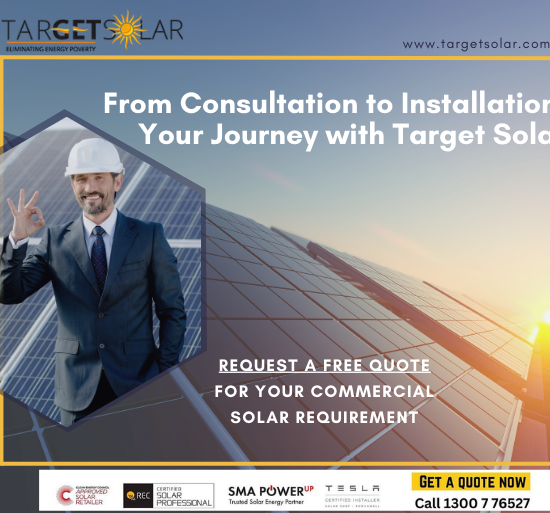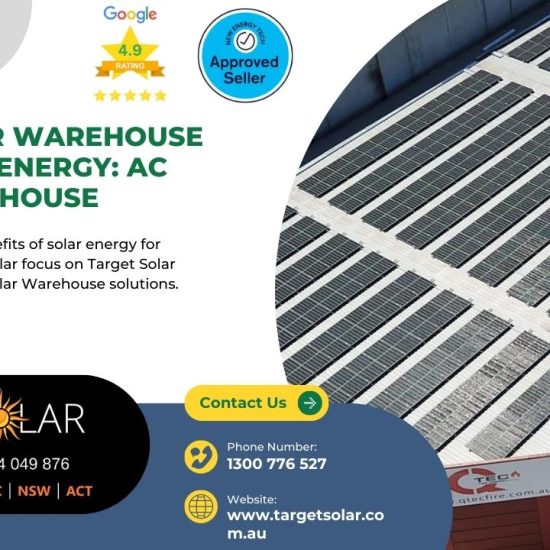Investing in a commercial solar system can deliver significant savings on energy costs while also enhancing your business’s sustainability credentials. But choosing the right solar system for your needs can be daunting given the multitude of options available. This guide will help you navigate the process, highlighting key factors to consider and providing examples of systems that may suit your needs.
- Understand Your Energy Consumption:
The first step to choosing a commercial solar system is understanding your energy needs. Review your electricity bills to determine how much energy you use and when you use it most. This will help guide the size of the system you need.
- Determine the Optimal System Size:
Solar system size is measured in kilowatts (kW), which reflects the amount of solar energy the system can produce under optimal conditions. Your energy consumption data will help determine the system size you need. For example, a medium-sized business might require a 50 kW system, while a large factory could need 100 kW or more.
- Choose Quality Components:
The efficiency and lifespan of your solar system will largely depend on the quality of its components. Prioritize Tier-1 solar panels and premium inverters. For instance, Risen 415W panels paired with Fronius inverters make a highly efficient, reliable system.
- Consider Your Available Space:
The size and orientation of your roof will affect the number and type of solar panels you can install. Flat commercial roofs can often accommodate more panels than sloped roofs. If space is limited, you may need to opt for high-efficiency panels to maximize output.
- Evaluate Financial Incentives:
Look into local and federal incentives that can offset the cost of your solar system. These could include rebates, tax credits, and feed-in tariffs for excess energy fed back into the grid.
- Get Expert Advice:
Working with a trusted solar provider like Target Solar can simplify the process. Our experts can assess your needs, recommend a tailored solution, and provide a detailed quote.
Here are three examples of commercial solar systems, each suitable for different types of businesses:
1. Small Business Solar System: 10 kW
Ideal for small businesses like cafes or retail shops, a 10 kW system generally consists of around 25-40 panels, depending on the wattage of the individual panels. A system of this size could generate around 40 kWh per day, which can significantly offset or even eliminate electricity costs for a small business.
For instance, you could use Trina Solar’s Honey TSM-DE08M.08(II) panels, each with a 400 W output, in combination with a Fronius Primo inverter. The Trina panels have excellent performance even under low light conditions and come with a 10-year product warranty. The Fronius Primo inverter integrates easily with future solar upgrades like battery storage or energy management software.
2. Medium Business Solar System: 50 kW
A 50 kW system is typically suitable for medium-sized businesses like office buildings or warehouses. This system may include approximately 125-200 solar panels and can generate around 200 kWh per day, a significant energy output that could cover a substantial portion of an office building’s energy usage.
For example, using 150 Risen RSM120-6-315M panels, each with a 315 W output, paired with a Fronius Symo inverter, could offer a great solution. Risen panels offer high module efficiency and reliable power output, and the Fronius Symo inverter allows for maximum flexibility in system design.
3. Large Industrial Solar System: 100 kW and above
Large commercial solar systems are suitable for big industries, manufacturing units, or large corporate offices with high energy consumption. A 100 kW system typically includes around 250-400 solar panels and can generate 400 kWh per day.
A system like this might comprise 300 JA Solar JAM60S10-340/MR panels, each with a 340 W output, coupled with multiple Fronius Eco inverters. JA Solar panels offer high-efficiency solar cell technology and excellent module performance, while Fronius Eco inverters are optimized for large-scale installations.
Remember, these are just examples and actual system specifications may vary based on your energy requirements, available roof space, local climate, and budget. It’s also important to consider other factors like warranties, future expansion possibilities, and local solar incentives. To get a system that’s custom-tailored to your business needs, consider working with a trusted solar provider like Target Solar. Our team can analyze your needs, recommend the best system for you, and provide a detailed quote.
Conclusion:
Choosing the right solar system for your commercial needs is a strategic decision that can reap significant rewards. By understanding your energy needs, considering your space, and seeking expert advice, you can invest with confidence.
Interested in transitioning to solar? At Target Solar, we have successfully completed over 500 projects, with each client benefiting from our expertise and commitment to quality. Request a free solar quote today or call us at 1300 776 527 to find the best solar system for your commercial needs. Don’t just take our word for it – check out our 150+ positive Google reviews!





